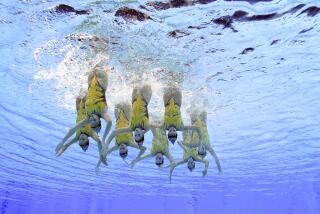Society Opposes Gym, Swim Class for Babies
- Share via
There is no evidence that gym and swim classes will promote physical development in very young children, and they may very well do harm.
The American Academy of Pediatrics, a nationwide organization of 39,000 pediatricians, has issued a statement warning parents against gym classes for babies.
“Many of these programs claim to accelerate the development of an infant’s or toddler’s strength and balance, necessary for such motor skills as crawling, walking, jumping and running,” said Dr. Suzanne Haefele, a pediatrician and former member of the AAP’s Committee on Sports Medicine.
“But children can--and do--develop these same skills through normal play and exploration. And because every child is different, each will progress on his own timetable. No data exists to suggest these programs will speed up development or give a child any other advantage.”
The AAP statement cautions that very young children could sustain injuries from activities common to infant exercise programs, particularly “passive stretching” in which the parent pulls on the baby’s limbs.
Dr. Michael Nelson, an Albuquerque, N.M., pediatrician who is chairman of the AAP’s Committee on Sports Medicine, said:
“Although there haven’t been any studies monitoring how often injuries occur in these infant classes because they are relatively new, we have seen fractures, strains and dislocations resulting from this type of activity.”
The AAP does not recommend swim class for children under 3.
“You cannot teach the concepts of drowning and water safety to a child younger than 3 or 4,” Nelson said. “Sure, you can get babies to imitate and do some paddling, but they aren’t capable of associating these actions with the thought process that says, ‘This is something I must do so I don’t drown.’
“If anything, these classes give parents a false sense of security about their child’s ability to handle himself in the water, causing them to be less vigilant. And once familiar with the water, a child is more likely to head into it when no one is looking.”
Doctors warn that infant swim classes have resulted in outbreaks of infectious diarrhea and also can lead to a more serious health hazard known as water intoxication. Dr. Paul Dyment, chief of pediatrics at the Maine Medical Center in Portland, explained:
“When babies are submerged in the pool during these classes, they frequently swallow water. Unlike older children and adults, babies do not have a reflex that ‘tells’ them not to swallow the water. As they continually gulp water, the sodium in their blood gradually becomes diluted. This can lead to seizures.”
More to Read
Sign up for Essential California
The most important California stories and recommendations in your inbox every morning.
You may occasionally receive promotional content from the Los Angeles Times.












